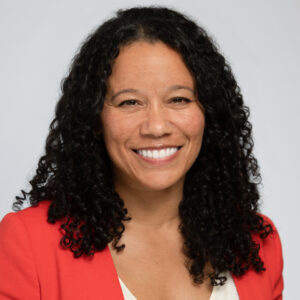Venture capital allows for a business to receive a quick infusion of cash, one that banks may be unwilling to make. Though a powerful financing method, venture capital is not always a suitable option for a business, nor equitably deployed. If a startup manages to make it through the diligence process, a mere 1.2 percent of venture capital reaches Black founders, a trend that cities in NLC’s City Inclusive Entrepreneurship (CIE) Ownership and Optionality commitment cohort aim to change.
In her role as Senior Tech, Equity & Inclusion Manager within Washington D.C.’s Office of the Deputy Mayor for Planning & Economic Development (DMPED), Joycelyn James seeks to attract capital to the city for businesses at all stages of growth. Yet, DMPED’s research demonstrates the capital needs of many entrepreneurs of color in the city go unmet. These businesses, James points out, see the District as a place to take root and grow, except they require financial investment to do so. “We saw this opportunity to partner with NLC to create this program and explore how we could do this,” James says, naming the Coalition for Nonprofit Housing and Economic Development (CNHED) as an important partner in this process.
The economic health of a community doesn’t lie in its business failure rate, it lies in its business formation rate. Venture capital is one of the biggest barriers to business formation.
Stephen Glaude, President and CEO Coalition for Nonprofit Housing and Economic Development (CNHED)
Making Venture Capital Work for Diverse Founders
Startup founders must first understand when venture capital investment is appropriate, and when it is not. Venture capitalists have specific expectations, such as growth rate, return on investment and business timelines. Furthermore, entrepreneurs must navigate a complex universe of terms and conditions to determine whether they are prepared to meet those expectations. Stephen Glaude, President and CEO of CNHED, notes the various training resources for traditional borrowing, whether from a bank or a community development financial institution (CDFI). Yet similar support services for venture capital are few and far between.
It is one of the reasons the CIE network was attractive to the city, reflects James. The team saw an opportunity to partner with an expert in this space, particularly one with an established network of diverse founders: Collab Capital. An Atlanta-based V.C., Collab works with the D.C. team, as well as five other cities, to identify and support at least two Black-owned startups either through direct investment via Collab’s innovative profit-sharing model, or by forging mentorship relationships with prominent anchor institutions.
Lindsey Poole, Vice President of Strategic Partnerships, leads the D.C. Community Anchor Partnership (DCAP) within CNHED. DCAP is a collaborative of 11 local institutions committed to supporting the growth of local minority-owned business enterprises (MBEs) through procurement. Poole stresses an important component of this work is systems change and the challenge of mental models. She sees no reason to exclude these entrepreneurs in thinking through what the needs of an institution might be.
“We have a role in challenging the assumption that Black- and brown-owned businesses don’t exist in the startup space, cannot be competitive from a technology standpoint or that they cannot be thought partners before an RFP is released,” says Poole.
Through the Ownership and Optionality CIE commitment, James, Glaude and Poole continue to connect diverse entrepreneurs with appropriate investment capital and new networks in which they can innovate and grow. Starting with venture capital has spurred novel ideas and relationships that the team plans to build upon to drive inclusive economic development in Washington D.C.
What D.C. Has Done So Far
- Created a Guide to Small Business Financing, as well as an RFP Response Strategy Toolkit
- Identified Cedar Hill Regional Medical Center, a $375 million, 136-bed, full-service hospital project as a large contracting opportunity (scheduled to open in December 2024)
- Vetted 85 businesses, ultimately referring 42 for 21 Cedar Hill Regional Medical Center contracts
- Hosted an information session with the hospital’s prime contractor and 32 local businesses
- Hosted RFP response training for 28 local businesses
- Connected Collab Capital to the BLCK VC DMV network to share insights about penetrating the D.C. market
Lessons Learned
Ecosystem builders must understand the limits of their expertise. DMPED and CNHED recognized other entities were better connected to diverse founders than they were. As a result, they partnered with organizations like Collab Capital, BLCK VC DMV, The Marathon Fund and 1863 Ventures to examine D.C.’s venture capital landscape build founder relationships.
When elephants fight, the grass always loses. The ecosystem which serves minority businesses tends to be more fragmented with fewer resources and should be shielded from competition between internal players as best as possible.
Normalize innovation. If venture capital is to become a stronger financial platform, those it seeks to help need support within their industry. If the infrastructure and mechanisms around these businesses do not normalize innovation, these efforts will never bear fruit.

